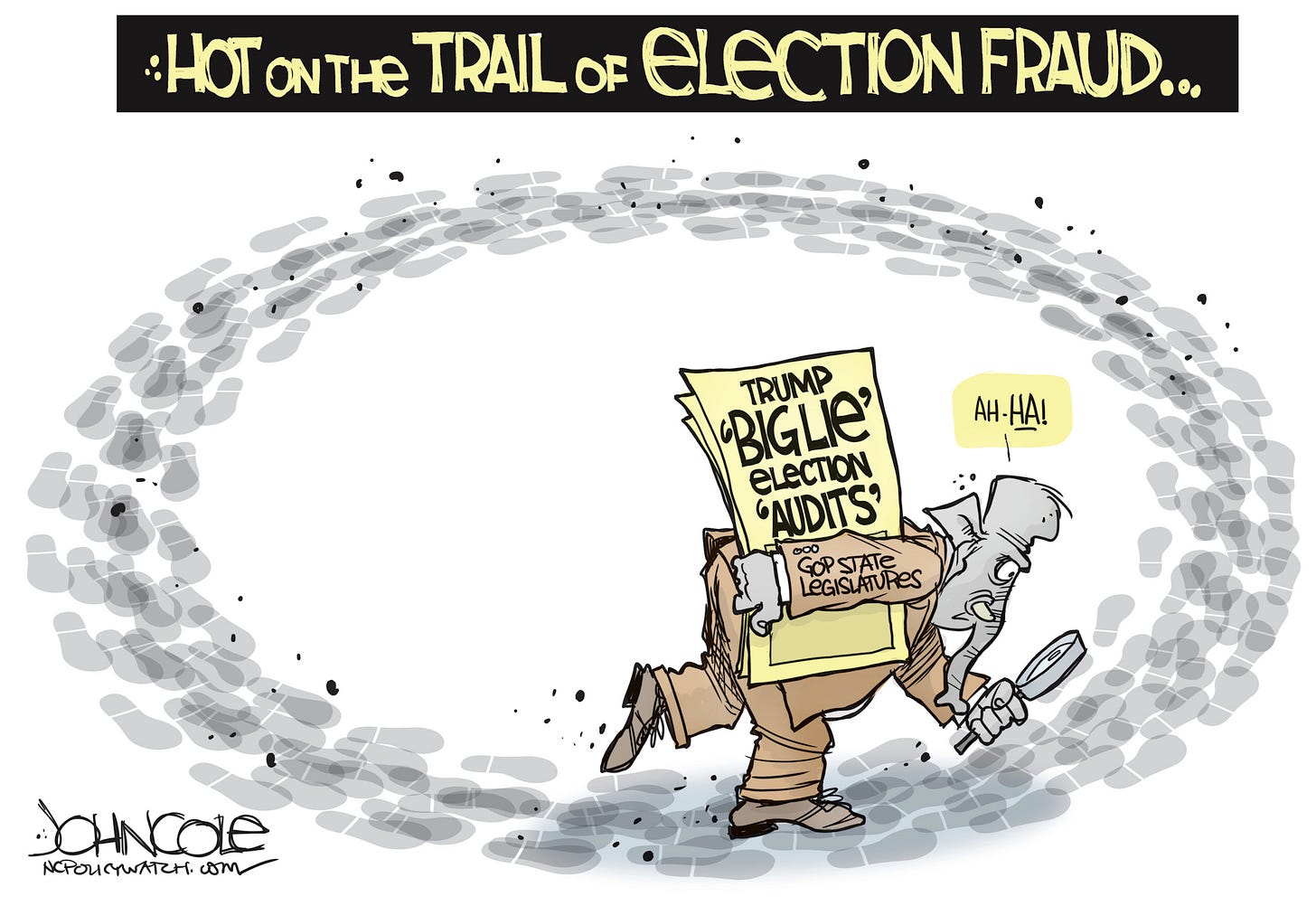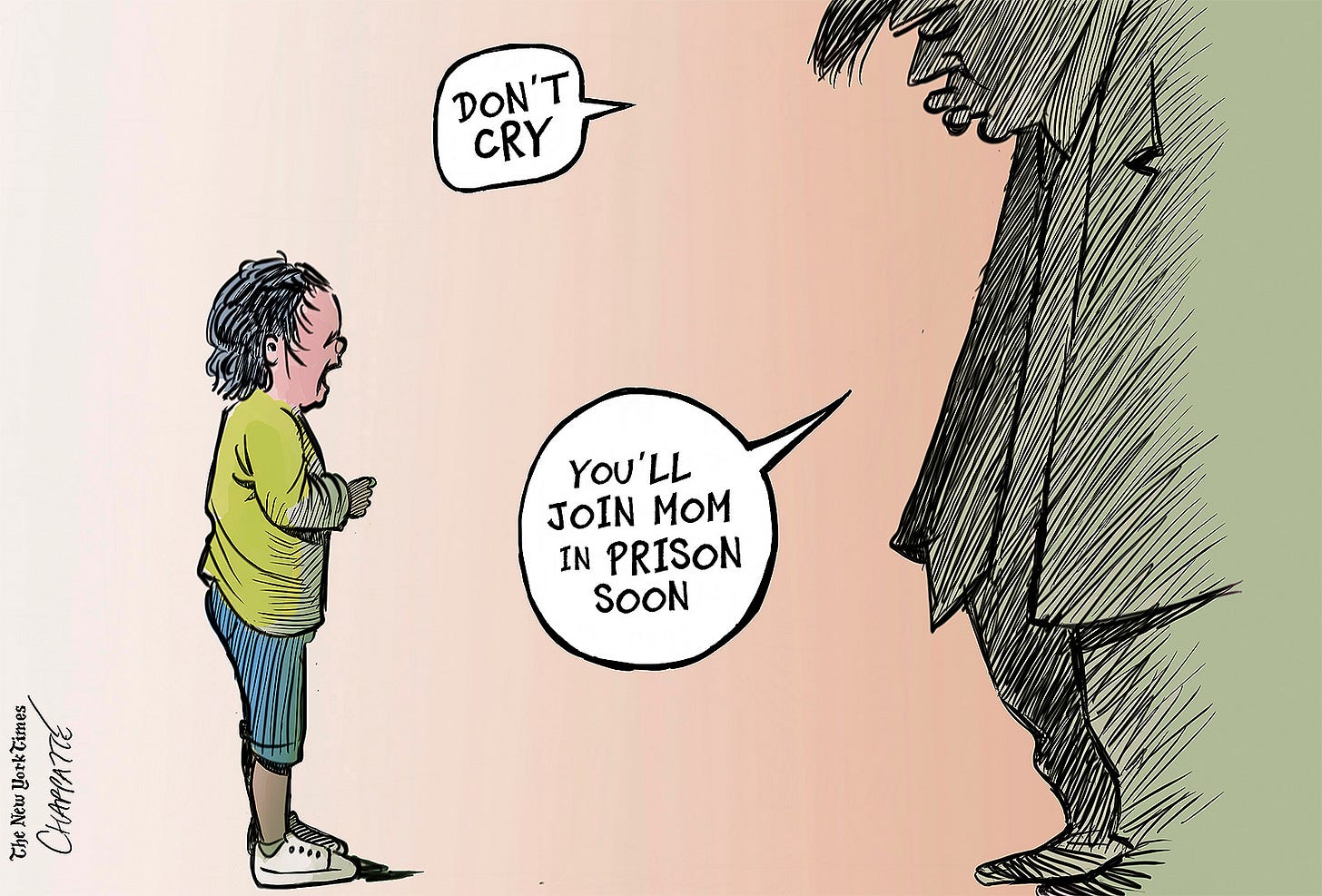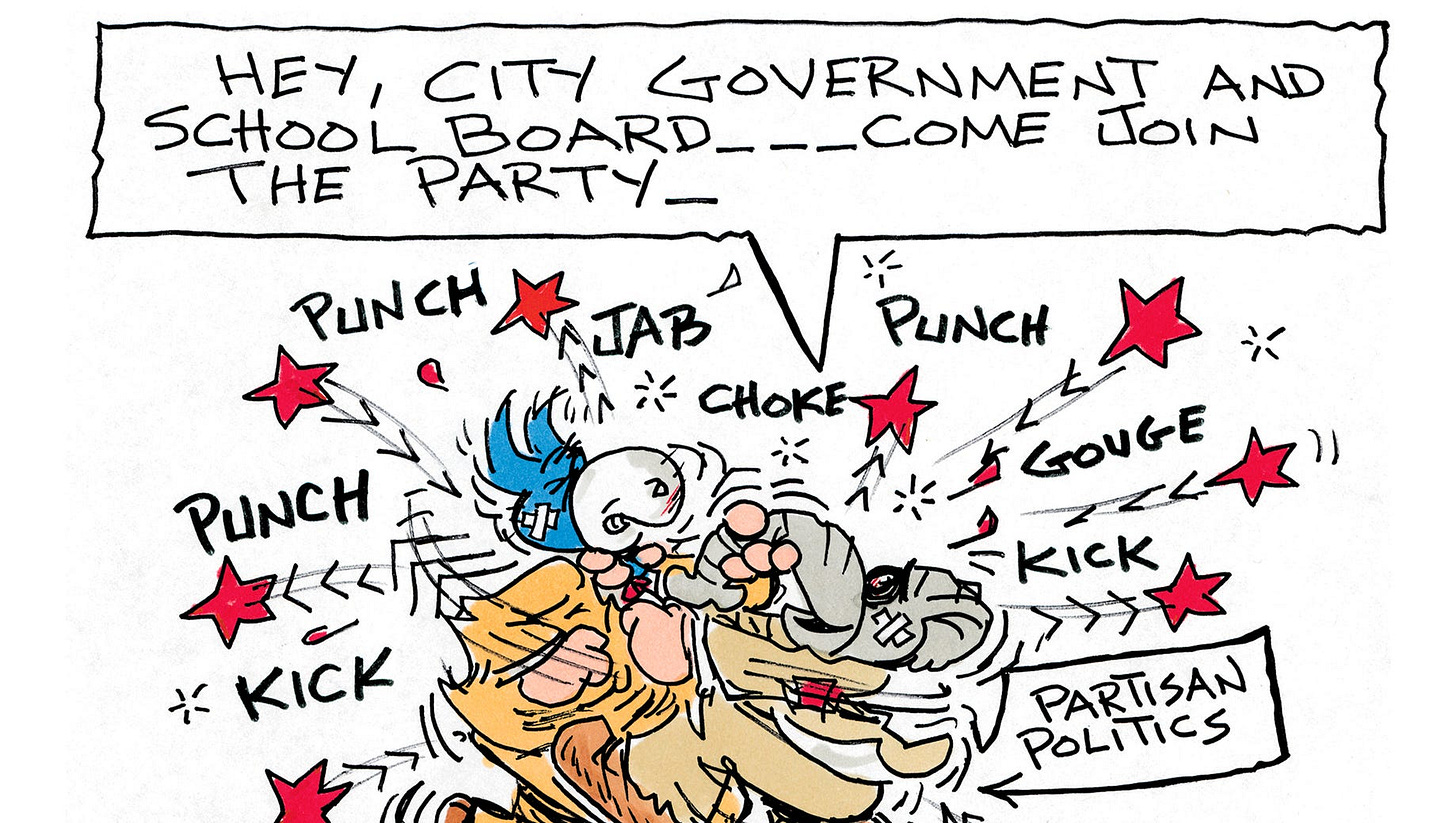CEBV Weekly: March 10, 2025
Act II of committees. Enough with the tax carve-outs. Exploiting disabled kids for political leverage. A gold star.
Act II of the 2025 Legislature is in full swing, with the House hearing Senate bills in committee and the Senate hearing House bills in committee. Legislative leaders will set a fast pace until the end of the month, with lawmakers doing everything they can to shove their pet projects through before the calendar runs out. Any bills not heard in committees before the end of the month face a quiet death.
Budget negotiations have yet to begin in earnest, and the issues facing our beloved state are many: a funding crisis for severely disabled children, a dramatic spike in ESA voucher spending, a withered general fund that can’t support restoring the cuts made last year, and tax-cut-happy lawmakers bent on withering it further; contentious topics like a Prop 123 renewal and restrictions on early ballots; and a hyper-partisan and acrimonious environment that makes it nearly impossible to get anything done at all. Republican legislative leaders say they’d like to pass a budget and adjourn next month, but that’s laugh-out-loud unlikely. It’s far more probable that session will stretch on, with the constitutionally mandated June 30 deadline to pass a state budget providing the only backstop.
CEBV continues to focus on the many harmful bills being heard in committees, and in helping you make your voices heard to increase the chances these bad ideas will receive a well-deserved veto stamp. As always, your input is incredibly important.
⏰ If you have 5 minutes: Act on the three Spotlight bills by using Request to Speak and contacting lawmakers directly to OPPOSE.
⏰⏰ If you have 20 minutes: Also use Request to Speak on the other bills in committees this week. Refer to the information, links and talking points in this Weekly to craft your own comments to lawmakers.
⏰⏰⏰ If you have 30 minutes: Also contact our Hall of Shame and Worst of the Week lawmakers (see those sections below) to tell them what you think.
⏰⏰⏰⏰ If you have 60 minutes: Join us on Zoom for our next CEBV Happy Hour conversation. We’ll offer an informative state legislative rundown, as well as our State Government 101 presentation. Happy Hour meets every Sunday at 4 PM through the end of legislative session. Sign up in advance here.
CEBV has long railed against some lawmakers’ stubborn insistence on passing tax carve-outs and loopholes year after year, at direct cost to our state and its residents. Unfortunately, despite lawmakers’ choice last year to pay for their giveaways with harmful budget cuts, they’re doing what they’ve done every single prior year: finding new, creative ways to make even more special interest carve-outs sound appealing. These are only a few of the many tax carve-out bills advancing through our legislature this year, at a total cost of hundreds of millions of dollars that will short-change all Arizonans by reducing desperately needed revenue, rinse and repeat.
SB1331 (Mesnard, R-13) would eliminate capital gains taxes beginning in 2026, at an estimated cost of $40-60 million a year.
HB2081 (Griffin, R-19) would exempt tips from Arizona income tax, at an estimated cost of $31 million per year. This could create loopholes that lead to wage restructuring, benefiting employers rather than employees.
HB2082 (Griffin, R-19) is a special-interest tax carveout for 4”+ pipes or valves that transport wastewater. The bill’s fiscal note estimates 176 miles of this pipe are laid in Arizona each year, and lowballs the cost by assuming all of it will be PVC, not the more expensive cast iron, copper or concrete.
Skyrocketing cost. Tax cuts further reduce Arizona’s already-starved ability to fund the public schools and services our residents need and want. State revenues are already stretched thin: our budget is one of the smallest per capita in the US, and our schools are funded at 49th in the country. Arizona’s tax carve-outs (also called “tax expenditures”) have skyrocketed from $16 billion in 2014 to over $29.9 billion in 2024.
Compounding the harm. Worse, as the federal government continues slashing needed programs and services, our state will be forced to absorb huge cost shifts. Our “Worst of the Week” section below highlights just one example: the $122 million budget hole in the Division of Developmental Disabilities that’s putting vulnerable families at risk. Tax carve-outs highlight the hypocrisy of state lawmakers who refuse to fund the programs and services our citizens depend on because Arizona “doesn’t have the money,” even as those same lawmakers actively slash state revenues year after year.
🚨 We cannot depend on vetoes for these bills. Gov. Hobbs recently told press she’s “willing to negotiate” with the Republican-controlled Legislature on passing tax cut measures. This is unacceptable. Lawmakers and the governor must repair the damage from last year’s budget cuts to colleges and universities, water system upgrades, road work and highway construction, job training programs and more. Shoving through more carve-outs for special interests just compounds the damage.
Enough is enough. It’s time for our legislature and governor to overhaul our tax laws and restructure to prioritize stable revenue streams that fund our future. We must make our opposition known. Use Request to Speak to contact the committees hearing SB1331, HB2081 and HB2082. Then contact your own senator and representatives and ask them to oppose the tax carve-outs that threaten Arizona’s future.
One of our tasks is to hold our allies accountable. This section calls out those who voted in favor of harmful bills. We ask them to heed and do better.
👎 Eva Diaz (D-22) for voting YES on SB1560 on the Senate floor. This bill would require referendum signature campaigns to adhere to strict compliance requirements, making it vastly more difficult for them to succeed. The bill’s sponsor, Vince Leach (R-17), has a long history of attacks on direct democracy. Rep. Diaz did not explain her vote. The bill now proceeds to the House to be heard in committee. Contact Diaz at eva.diaz@azleg.gov or 602-926-3473.
👎 Six House lawmakers for voting YES on HB2867 on the House floor. This bill would ban K-12 public schools and universities from “teaching, promoting, funding or training students” in “antisemitic conduct.” The poorly worded bill does not define antisemitism, but mentions any conduct “creating a hostile educational environment": this is often coded language for avoiding any discussion that deals with thought-provoking or difficult subjects. Teachers would be personally liable for damages, which puts them at risk of frivolous lawsuits. The bill now proceeds to the Senate to be heard in committee. Contact these lawmakers as follows:
Seth Blattman (D-9): sblattman@azleg.gov or 602-926-3996
Alma Hernandez (D-20): ahernandez@azleg.gov or 602-926-3136
Consuelo Hernandez (D-21): chernandez@azleg.gov or 602-926-3523
Lydia Hernandez (D-24): lhernandez@azleg.gov or 602-926-3553
Elda Luna-Nájera (D-22): eluna-najera@azleg.gov or 602-926-3881
Myron Tsosie (D-6): mtsosie@azleg.gov or 602-926-3157
** Before you contact these lawmakers, be aware that some of them mistakenly and proudly conflate Judaism with Zionism, mischaracterizing constructive criticism of harmful Israeli policies as attacks on Jewish existence. Your choice of words will matter greatly.
Remember a couple weeks ago, when we blasted David Livingston (R-28) for hanging disabled kids out to dry and trying to exploit the situation for political points? We thought the bar couldn’t get any lower — but Rep. Livingston and his colleagues have gotten out a jackhammer. Legislative Republicans are now using these vulnerable families as leverage to try to get their way in budget negotiations with Gov. Hobbs.
These Republicans are blocking all efforts to keep the Division of Developmental Disabilities running, saying they will only fund it the “right way.” By that, they mean it must be part of state budget negotiations between the Legislature and the governor. DDD projects it will run out of cash in April, but Republicans keep voting down attempts to pass a supplemental appropriation. Not only do they want cuts to the program, but they’ve recently made it clear they’re holding families over a barrel to get their way with Hobbs:
“If the DD community wants this fixed, please reach out to Gov. Hobbs and tell her to negotiate with the House and Senate and pass a budget to fix this… and she has to bring reforms to it,” said Rep. David Livingston (R-28).
Sen. John Kavanagh (R-3) was more direct: “Excellent incentive to get the governor to engage in budget negotiations.”
When asked, Gov. Hobbs reminded reporters that she’d sent legislative Republicans her executive budget proposal on January 17 (as required by law), as well as a budget update due to this year’s dramatic spike in spending on ESA vouchers. “They won't send me anything to negotiate on,” she said. “They know where my position is. They have my budget, and they're just saying no, no, no, no.”
And saying no is part of the design: they’re loath to give Hobbs any policy wins because they want to replace her in 2026. In other words: if they can get the governor they want, disabled kids make perfectly acceptable collateral damage.
Democracy
SB1052, sponsored by Wendy Rogers (R-7), would ban US citizens from registering to vote in Arizona if they have a parent who is a US citizen and who is registered to vote in Arizona, but they themselves have never lived in the US. Banning citizens from voting is clearly unconstitutional. Scheduled for House Federalism, Military Affairs & Elections Committee, Wednesday. OPPOSE.
HB2008, sponsored by John Gillette (R-30), would require notaries to obtain fingerprint clearance cards and to provide their thumbprint with each notarization. Many private citizens become notaries to assist with citizen initiatives. Asking them to get a fingerprint clearance card at personal expense, and forcing the additional hurdle of a thumbprint for the notarization of each petition, would place an unneeded burden on citizen participation in direct democracy. Scheduled for Senate Government Committee, Wednesday. OPPOSE.
HB2060, sponsored by Lisa Fink (R-27), would require all federal elections on the Arizona ballot be run according to state election law, including voter registration requirements, proof of citizenship, proof of residency, and proof of ID. This is patently unconstitutional: Article VI, Clause 2 of the US Constitution (known as “the Supremacy Clause”) specifies that federal law takes precedence over state law. Scheduled for Senate Judiciary & Elections Committee, Wednesday. OPPOSE.
HB2081, sponsored by Gail Griffin (R-19), would exempt tips from Arizona income tax. The bill’s fiscal note estimates the move would cut the state's general fund by $31 million per year. State revenues are already stretched thin and will be forced to absorb huge cost shifts as the federal government cuts programs. As the current federal administration pushes for a similar and massively expensive change, critics warn that exempting tips from taxation could create loopholes that lead to classifying ever more jobs as tip-eligible, thus allowing employers to cut reliable wages and shift the additional worker pay burden to us — the customers. Arizona’s tax carve-outs (called “tax expenditures”) have skyrocketed from $16 billion in 2014 to over $29.9 billion in 2024. Scheduled for Senate Appropriations Committee, Tuesday. OPPOSE.
HB2547, sponsored by Lupe Diaz (R-19), would strip public funding from health centers that mention abortion to patients. This would defund clinics that provide other reproductive and health care services if they inform women that they are legally entitled to terminate a pregnancy, blatantly violating the recently voter-approved Prop 139. Scheduled for Senate Government Committee, Wednesday. OPPOSE.
HB2649, sponsored by Steve Montenegro (R-29), would affirm the Legislature’s belief in the importance of the Electoral College for presidential elections. We disagree. The Electoral College is no longer a constructive force in American politics; it’s time to move to direct popular election of presidents. Scheduled for Senate Judiciary & Elections Committee, Wednesday. OPPOSE.
HB2651, sponsored by Steve Montenegro (R-29), is a copy of a bill vetoed in 2023 that would ban all electronic voting equipment beginning in 2029 unless it meets Department of Defense cybersecurity standards, all pieces of it are made in the US, and the auditor general is given copies of the source codes. This type of equipment does not exist. Inspired by a baseless conspiracy theory about vote-flipping supercomputers. Scheduled for Senate Judiciary & Elections Committee, Wednesday. OPPOSE.
HB2824, sponsored by Tony Rivero (R-27), would allow the legislature to arrest anyone who refuses to comply with a subpoena they issued — including another elected official — and physically haul them before a committee. This is a clear response to a partisan stunt orchestrated last year: some of the furthest-right members of the Legislature convened a committee hearing to call for the impeachment of Attorney General Kris Mayes for protecting Arizonans from their overreach. Mayes, along with all legislative Democrats, refused to attend the hearing, pointing out (rightly) that it was based on nothing more than the far right disagreeing with Mayes, and "makes a mockery of real legislative oversight." Scheduled for Senate Government Committee, Wednesday. OPPOSE.
Education
SB1020, sponsored by Wendy Rogers (R-7), would prohibit universities and community colleges from banning anyone with a concealed weapons permit — not just students — from possessing, storing or transporting guns on campus. College campuses and guns are a deadly combination, increasing the risks of suicide, homicide and sexual assault. Even our founding fathers believed guns had no place on college campuses. Scheduled for House Judiciary Committee, Wednesday. OPPOSE.
SB1091, sponsored by Jake Hoffman (R-14), would require that ballots in school district bond and budget override continuation elections state how much voters' taxes would drop if they refused to pass the continuations. This is propaganda designed to discourage voters from supporting overrides in the name of "transparency." Scheduled for House Education Committee, Tuesday. OPPOSE.
SB1133, sponsored by Wendy Rogers (R-7), would create a new section of state law requiring the State Board of Education to mandate schools teach the history of communism and domestic communist movements in high school social studies, along with a comparative discussion of "political ideologies that conflict with the principles of freedom and democracy foundational to the United States." State lawmakers shouldn’t be mandating curriculum; that’s the job of educators who are trained in curriculum development. Scheduled for House Education Committee, Tuesday. OPPOSE.
SB1164, sponsored by Warren Petersen (R-14), would force public schools in Arizona to open their doors to ICE agents. The US Supreme Court ruled in 1982 that all children, regardless of immigration status, have the right to a free public education. Some Arizona districts are instituting “safe zone” policies to protect their students, stating that no individual or organization that would create an educational disruption is allowed on school grounds. This bill would override those policies. The bill appropriates unspecified amounts from the state general fund — in other words, blank checks — to county sheriffs' offices and the state Department of Corrections to administer the legislation. Scheduled for House Government Committee, Wednesday. OPPOSE.
SB1255, sponsored by Shawnna Bolick (R-2), would require each school district and individual public school to post on its website information on students’ race, color, national origin, sex, disability, and age that is meant for the US Department of Education’s Office of Civil Rights. Schools would also have to complete a new survey on bullying, fighting and harassment. Public schools are already subject to many laws covering discrimination and bullying, making this an excessive overreach. Meanwhile, kids at ESA voucher-funded schools have no such protections. Scheduled for House Education Committee, Tuesday (it was discussed and HELD on 3/4). OPPOSE.
SB1269, sponsored by Wendy Rogers (R-7), would let district and charter school boards allow volunteer school chaplains into schools to provide support, services or programs to students. The bill does not specify what the chaplains' roles would include, set any training or certification requirements, or require that students from a range of faith traditions be accommodated. Most credentialed chaplains are not qualified to address the needs of public school students and cannot replace trained school counselors or other student support staff. The ramifications for tracking people's religious affiliations alone are dangerous. Scheduled for House Education Committee, Tuesday. OPPOSE.
SB1331, sponsored by JD Mesnard (R-13), would eliminate capital gains taxes beginning in 2026. The bill's fiscal note says this would cost the state between $40 million and $60 million a year. Tax cuts further reduce Arizona’s already-starved ability to fund the public schools and services our residents need and want. Our budget is one of the smallest per capita in the US, and our schools are funded at 49th in the country. Arizona’s tax carve-outs (called “tax expenditures”) have skyrocketed from $16 billion in 2014 to over $29.9 billion in 2024. Scheduled for House Ways & Means Committee, Wednesday. OPPOSE.
SB1441, sponsored by Carine Werner (R-4), would make school board elections partisan, a move being pushed by national extremist organizations. Local school boards are our most democratic institutions, and should stay above party politics. Making school boards partisan turns districts and schools into just another venue for extremist conflict. This idea failed in committee in 2022 and was vetoed last year. Scheduled for House Education Committee, Tuesday. OPPOSE.
SB1625, sponsored by Carine Werner (R-4), would expand the Arizona School Spending Portal to force district and charter schools to report each general ledger entry, including revenues, expenditures and disbursements. This is bureaucratic red tape that would snarl schools in time-consuming overreporting, not to mention a massive government overreach. Meanwhile, Arizona's ESA voucher program has zero transparency by design. Scheduled for House Education Committee, Tuesday. OPPOSE.
HB2018, sponsored by Matt Gress (R-4), would allow private and for-profit universities in Arizona to give taxpayer-funded financial assistance to students in teacher training programs on the same terms as those at Arizona’s three state universities. These private, for-profit universities would get a share of the $20 million in tax funding, decreasing the funding available to accredited public universities which have much more robust and successful programs. Public universities do a more efficient job of providing education to a wider range of students with fewer dollars; private universities are often more selective, costlier and do not offer in-state benefits for students. This is not only privatization, but poor value for tax money. Grand Canyon University pushed a similar bill the last two years, which failed to pass. Scheduled for Senate Appropriations Committee, Tuesday. OPPOSE.
HB2484, sponsored by Beverly Pingerelli (R-28), would require district charter school boards to restrict student access to the internet, including social media, and limit students’ use of phones during the school day. A national trend that is already being handled on the local level. Schools should be allowed to set their own policies and not struggle under top-down legislative mandates. Scheduled for Senate Education Committee, Wednesday. OPPOSE.
HB2814 and HCR2015, sponsored by Lisa Fink (R-27), would let the legislature direct federal funding however they wish if Trump dissolves the Department of Education and turns the money into block grants to states for them to spend as they please, with no strings attached. This could allow Arizona to redirect federal funds meant for high-need kids to private school vouchers for the wealthy, with no strings attached. As a ballot referral, HCR2015 would circumvent the governor's veto. Both are scheduled for Senate Appropriations Committee, Tuesday. OPPOSE.
HB2920, sponsored by Justin Olson (R-10), would require county treasurers to include school district property tax rates on bills and statements. This and other bills introduced by Olson go out of their way to point out the costs that fall to counties and localities when the state — namely the legislature — fails to adequately fund public schools. Scheduled for Senate Finance Committee, Monday. OPPOSE.
HCR2042, sponsored by Steve Montenegro (R-29), asks voters to enshrine racism in the state Constitution. This culture-war-driven measure would prevent the state from giving BIPOC-owned businesses any preference in state contracts, keep school districts from specifically hiring BIPOC teachers in an effort to increase representation, block teachers from discussing inclusion and equity issues that have arisen despite the 14th Amendment, ban certain content from being taught in schools, and block trainings on how to support LGBTQ+ staff and students. This would negatively impact student learning, harm teacher retention and recruitment, and do nothing to prevent discrimination in taxpayer-funded private schools receiving ESA vouchers. The legislature would be allowed to also "prescribe related practices or concepts" to ban, an open-ended provision that would tack on any conceivable misguided notion. Scheduled for Senate Government Committee, Wednesday. OPPOSE.
LGBTQ+
SB1443, sponsored by Carine Werner (R-4), gives parents the explicit legal right to make mental health care decisions for their minor child, and creates a mandatory minimum $2,500 judgment against "governmental entities or officials" (such as schools and teachers) who violate that "right." This would put at risk every public school teacher and school counselor who supports the mental health of a minor student with unsupportive parents. Scheduled for House Judiciary Committee, Wednesday. OPPOSE.
HB2113, sponsored by Nick Kupper (R-25), would ban the display of certain flags on public property in Arizona, such as LGBTQ+ Pride and Black Lives Matter flags. The flags would be banned from state, city, county and school buildings on the grounds that they promote "divisive messages." The bill, which appears to be driven by the anti-LGBTQ+ hate group Libs of Tiktok, is so far-reaching that people with flag stickers on their cars who drive onto public property would be breaking the law. It presents free speech issues and will cause vulnerable students to feel uncomfortable or unsafe in school simply for being who they are. A family was recently run out of a far East Valley community for displaying a Pride flag. Scheduled for Senate Government Committee, Wednesday. OPPOSE.
HB2126, sponsored by Julie Willoughby (R-13), is a copy of a vetoed bill from last year that would require health care entities to give parents access to all of their minor children’s medical records, even for services that don’t require parental consent. This effectively would strip minors of their right to medical privacy and strip medical professionals of the right to exercise their professional judgment on when to divulge information. The bill is being pushed by the evangelical Christian lobbying group Center for Arizona Policy. Scheduled for Senate Health & Human Services Committee, Wednesday. OPPOSE.
Water
HB2082, sponsored by Gail Griffin (R-19), would exempt pipes or valves with a diameter of 4” or larger from sales tax if they are used to transport wastewater. The bill’s fiscal note estimates that 176 miles of this pipe are laid in Arizona each year, and lowballs the cost to the General Fund by assuming all of it will be PVC, not the more expensive cast iron, copper or concrete. Arizona’s tax carve-outs (called “tax expenditures”) have skyrocketed from $16 billion in 2014 to over $29.9 billion in 2024. Our state just cannot afford to keep giving away more and more of its money. Scheduled for Senate Finance Committee, Monday. OPPOSE.
HB2270, sponsored by Gail Griffin (R-19), would add stormwater recharge (the process of capturing and filtering runoff water from storms in urban areas to replenish aquifers) to the list of sources that are considered in groundwater modeling in Active Management Areas. A spokesman for the Arizona Department of Water Resources warned in committee testimony that, because state water models already account for stormwater, this bill could lead to double-counting water, resulting in overuse and potential overpumping. Scheduled for Senate Natural Resources Committee, Tuesday. OPPOSE.
This Monday night, we’ll offer our State Government training. Learn how it works and find your role in making change! The link to sign up, along with so many others, are available on our Linktree:
2025 Session Timeline
Friday, 3/28 Last day for a bill to get out of committees in its crossover house
(and the last day to use RTS until a budget drops)
Tuesday, 4/22 100th Day of Session (the stated end goal; can be changed)
Monday, 6/30 Last day to pass a constitutionally mandated state budgetFlag this handy list of contact info, committee chairs and assignments:
Bookmark CEBV’s Linktree. Want other ways to take action or stay informed? Looking for our social media? It’s all on our Linktree.
Have you been wondering who got the gold star we mentioned in the intro? You did, for making it to the end of this Weekly! Enjoy.




















